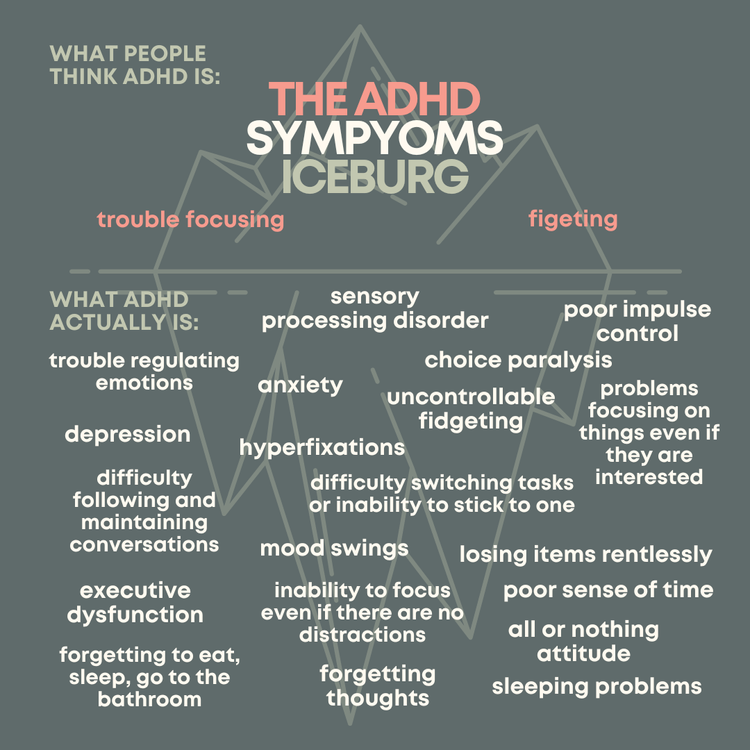Living with ADHD as an adult isn’t just about distraction and forgetfulness. For many, it’s also tangled up with anxiety, depression, low self-esteem, and emotional exhaustion. You might feel like you’re always “behind,” always overthinking, and constantly juggling a hundred tabs open in your brain—without a roadmap or reset button.
If that sounds familiar, you’re not alone. And you’re not broken.
As a therapist who works with neurodivergent adults, I often see how ADHD overlaps with other mental health challenges in ways that are deeply misunderstood. So let’s talk about it—and how you can support yourself with compassion and clarity.
The Overlapping Struggles of ADHD + Anxiety
Here’s how ADHD and anxiety often feed into each other:
-
Executive dysfunction delays tasks, which creates stress… which increases anxiety.
-
Anxiety leads to over-planning or perfectionism, which makes tasks harder to start—classic ADHD paralysis.
-
Negative self-talk creeps in (“Why can’t I just do the thing?”), reinforcing shame and reducing motivation.
-
Your nervous system stays in overdrive, even when your body is exhausted.
And this cycle is often invisible. Because from the outside, you may seem high-functioning or even successful—while inside, you’re overwhelmed and burnt out.
Other Common Co-Occurring Conditions
Adults with ADHD may also experience:
-
Depression – Often from years of feeling “not good enough” or failing to meet expectations.
-
Rejection Sensitive Dysphoria (RSD) – Intense emotional reactions to perceived criticism or failure.
-
Sleep Disorders – Trouble falling or staying asleep due to racing thoughts or dysregulated rhythms.
-
Sensory Sensitivities – Overwhelm from noise, light, texture, or environments that feel chaotic.
These aren’t “separate problems”—they’re often part of the ADHD picture, especially when it’s gone undiagnosed for years.
So What Can Help?
Here are a few supportive, realistic strategies that can make a meaningful difference:
1. Name What’s Happening (Without Shame)
Start by acknowledging the reality: your brain works differently, and anxiety isn’t a failure—it’s a response. Naming your experience (without judgment) can help you interrupt the spiral of shame and self-blame.
Try saying: “This isn’t me being lazy. My brain is overwhelmed and needs a different approach.”
2. Break Tasks into Micro Steps
If a task feels huge, your brain might freeze. Break it down smaller than you think is necessary. For example: “Open the laptop,” “Find the file,” “Write one sentence.” Celebrate each tiny success.
3. Use External Structures
ADHD brains thrive with external supports. Try:
-
Timers or alarms to remind you to pause or switch tasks
-
Visual checklists or whiteboards
-
Accountability partners (someone to check in with you)
-
Scheduling breaks before you hit burnout
4. Focus on Nervous System Regulation
Because ADHD and anxiety both affect your nervous system, practices that soothe and regulate can help:
-
Body-doubling (doing tasks with someone nearby, even virtually)
-
Sensory tools (weighted blankets, noise-canceling headphones, calming textures)
-
Breathwork, grounding exercises, or gentle movement
-
Scheduled “worry time” to give your brain permission to let go after
5. Seek Neurodivergent-Affirming Support
Working with a therapist who understands ADHD and anxiety (especially in adults) can help you untangle the root issues, build new strategies, and release shame.
It’s Not Just You
If you’re an adult with ADHD navigating anxiety, you’re carrying a lot—and you’ve probably been doing it alone for too long. You deserve support that sees the full picture and offers real tools, not just surface-level advice.
At Therapy Dynamics, we offer comprehensive ADHD evaluations and ongoing support that takes into account your whole self—not just your symptoms. If you’re feeling overwhelmed, anxious, or stuck, let’s explore what’s beneath the surface.
➡️ Book a free 30-minute consultation to see if an evaluation or support session is right for you.
